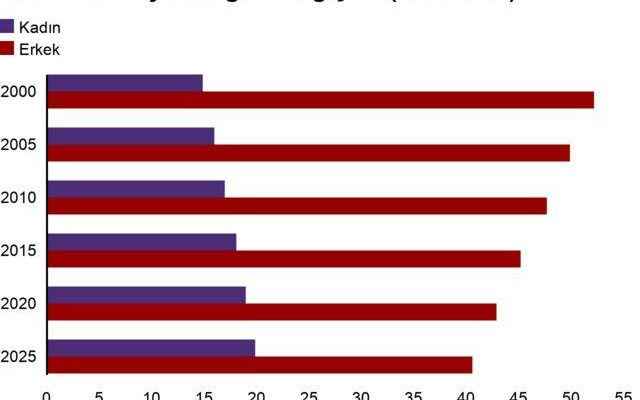The World Health Organization (WHO), which uses the term “tobacco epidemic” for the widespread use of tobacco, says it is one of the biggest public health threats we have ever faced, and reports that it kills more than 8 million people a year. 1.2 million of these deaths are due to passive smoking. While the rate of men who use tobacco is decreasing in Turkey, the rate of women is increasing.
May 31 is recognized as World No Tobacco Day. This year, the World Health Organization draws attention to the damage tobacco does to the planet.
Publishing the report “Tobacco: Poisoning Our Planet”, WHO states that the production and consumption of tobacco causes annual carbon emissions of 80 million tons.
22 billion tons of water is used annually for tobacco production; Every year, 5% of forest areas around the world are deforested to grow tobacco.
With the consumption of cigarettes, 2 million tons of package waste is created and every year 4.5 trillion butts are thrown into the environment, poisoning the water and soil, and even causing forest fires.
The industrial life cycle of tobacco, from production to consumption, results in a total of 25 million tons of waste annually.
Smoke-free beaches are becoming more common in Spain due to environmental pollution
Among the solution proposals in the WHO report are “eco-tax” practices to hold the tobacco industry responsible for the damage it causes to the environment. In addition, bans are becoming more common in public spaces where cigarette waste is one of the most important causes of pollution.
The Nofumadores.org campaign, which has been promoting the ban on smoking on beaches in Spain since 2018, fights not only for health but also for the environment.
Nofumadores.org started its lobbying activities for the spread of smoke-free beaches across the country with a petition. Despite the fact that the online petition was only shared organically through social media accounts, 107 thousand signatures were collected within 2 weeks. There turned out to be great support for this measure among the Spaniards. Last March, they reached 331 thousand signatures.
The first smoke-free beach in Spain was created in 2006, but by 2018 only 3 percent of beaches were smoke-free. However, after campaigns across Spain, this number increased to 525 in 2021, reaching 17.5 percent of all beaches.
A new ecological bill, approved on April 4, makes it possible to impose fines of up to 2,000 euros on smoking on beaches. The law is expected to enter into force by July 2022.
Tobacco use rates worldwide are falling steadily
Tobacco use is declining steadily, according to a worldwide survey of tobacco use by the WHO, the results of which were published in November 2021.
In 2000, approximately one third of the world’s population (32.7 percent) was a tobacco user, while this rate has decreased to less than one fourth (22.3 percent) by 2020, with the efforts to control tobacco use. If current efforts continue in all countries, the rate is estimated to decrease to one-fifth by 2025.
While the rate of men who use tobacco is decreasing in Turkey, the rate of women is increasing
According to the results based on 2020 data, the rate of tobacco users in Turkey is 30.7 percent. For men, the rate is 42.1 percent; 19.2 percent for women.
The report shows how the rate of tobacco use in countries has changed between men and women since 2000. According to this, while the rate of tobacco use among men in Turkey is decreasing, it is increasing among women.
TÜSAD: Cigarette consumption in Turkey causes 21 thousand tons of waste annually
Turkey ranks first among OECD countries in the ratio of smokers over the age of 15 to the entire population. Accordingly, smokers in Turkey constitute 28 percent of the entire population. Turkey is followed by Indonesia with 27.6 percent smoking rate and Russia with 25.8 percent.
Turkish Respiratory Research Association (TÜSAD) Tobacco Control Working Group says that according to 2018 data, nearly 118.5 million cigarettes are consumed in Turkey, resulting in 57 tons of waste per day and 21 thousand tons of waste annually.
